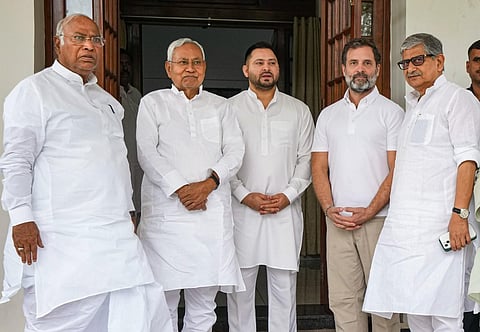Opposition unity depends on Congress ability to give and take
The presence of two Opposition stalwarts, Bihar CM and JD(U)’s Nitish Kumar and NCP chief Sharad Pawar, has re-centred the focus on unity talks among non-BJP parties for 2024. By calling on Rahul Gandhi, the two leaders appear to have indicated the one issue that needs resolving first: That the Congress appears to be the elephant in the room for opposition unity. Nitish Kumar arrived in Delhi earlier
this week to initiate the process of bringing the opposition parties together. He met RJD leader Lalu Yadav, Mallikarjun Kharge and Rahul Gandhi of the Congress, AAP’s Arvind Kejriwal and Left leaders Sitaram Yechury and D Raja.Immediately after Nitish’s visit, Pawar landed in Delhi to hold talks with the Congress leadership.
A key issue in both meetings was the reluctance of regional opposition parties to join hands with the Congress. While Pawar advised Rahul to go slow on his attacks on Savarkar as it threatened the alliance’s continuance in Maharashtra, Nitish said that he would take the lead to engage with the opposition parties that are not comfortable in the company of the Congress. Among them are two sets of parties. K Chandrashekar Rao’s BRS, Mamata Banerjee’s TMC, and Kejriwal’s AAP are on one side. This group is in favour of forming an opposition front without the Congress. Then there are parties like BJD and YSRCP, which prefer contesting the election on their own, equidistant from the Congress and the BJP. Nitish has assured the Congress that he will engage with both sets of parties and try to ensure their support for a non-BJP front post-Lok Sabha polls. His assurance comes even as most regional parties are wary of uniting under the Congress leadership.
Sitaram Yechury tried to diffuse the leadership issue by seeking to freeze it till after the elections, reminding the parties that the National Front in 1996 and the United Progressive Alliance in 2004, which came to power, were formed after the elections. He also suggested that the alliance among opposition parties should be state-specific rather than national-level seat sharing. The initiatives by Nitish Kumar, Sharad Pawar and Sitaram Yechury indicate the Congress party’s limited appeal among opposition parties not allied with it. The progress of unity talks depends as much on convincing the wary regional parties as on how the Congress adapts to group play.

